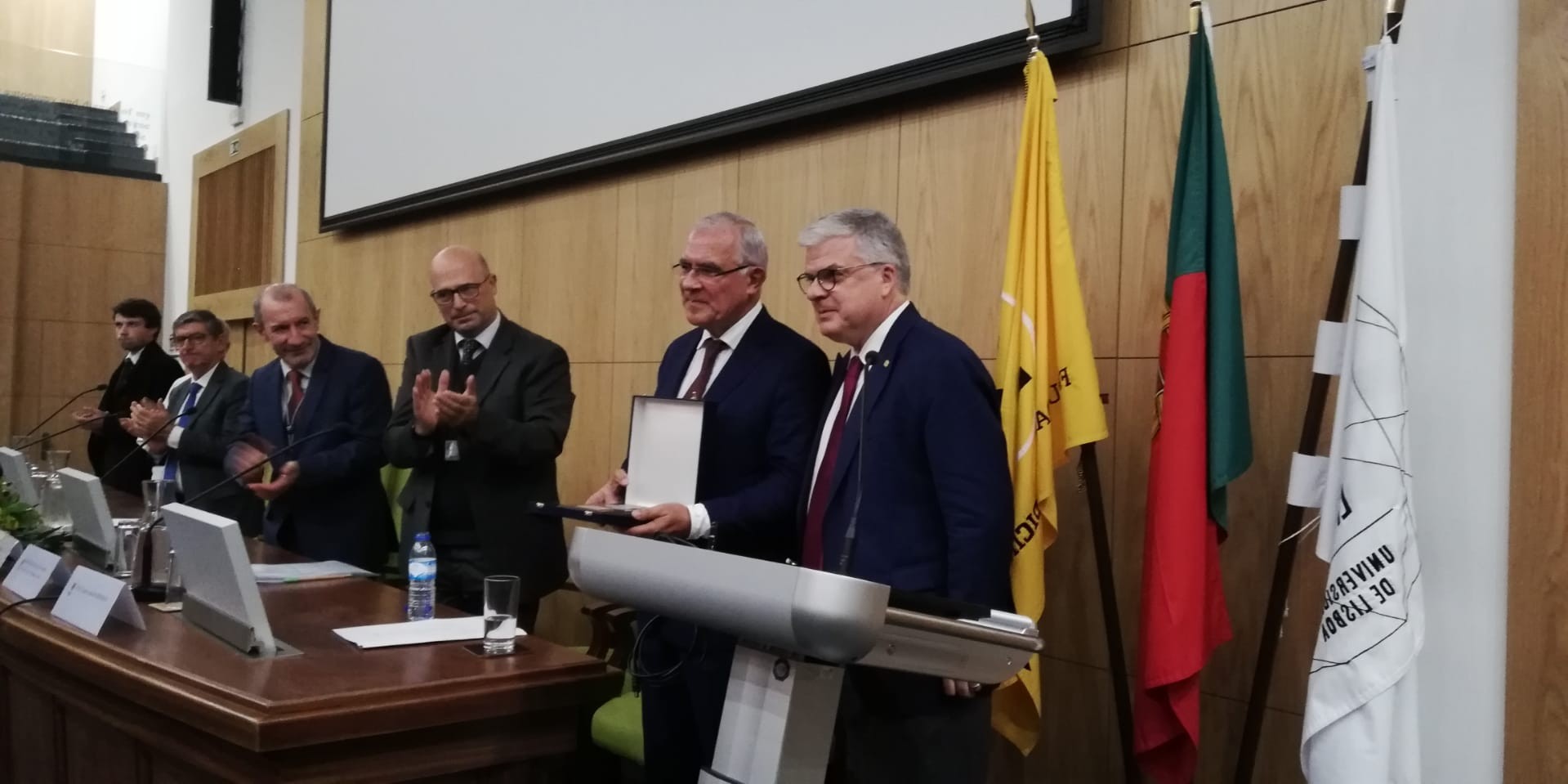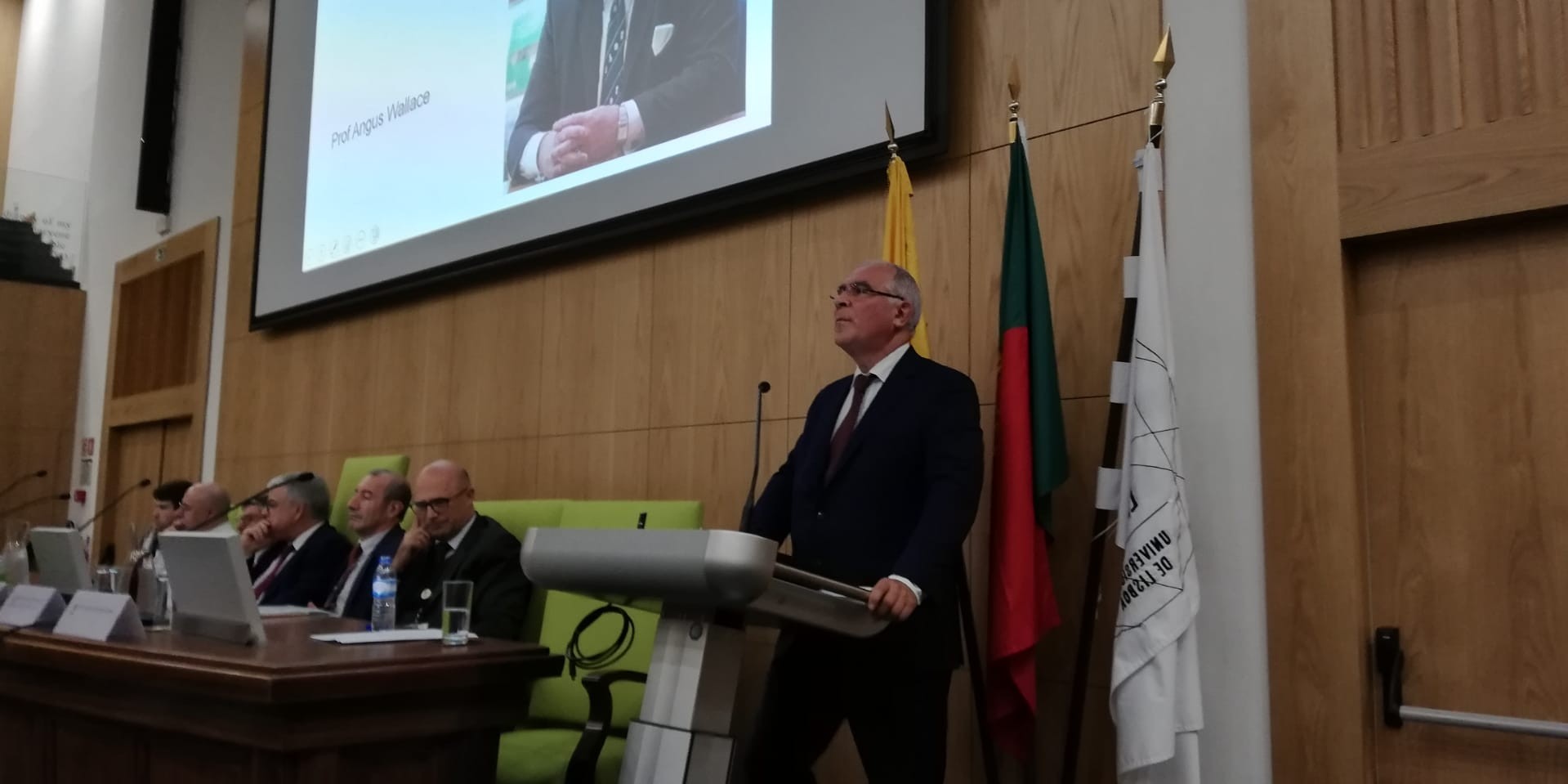
Last lectures are always moments of cycle change in the life of those who give them in the first person.
They always contain a pinch of farewell, longing, career summary, the signature of the work done and the perspective of what life still holds.
In these last lectures, which are addressed to a more heterogeneous audience, one almost always feels privileged to be in the front of a brilliant personality who has done so much to be able to retire in glory that day. This last lecture of Jacinto Monteiro thus felt like a lesson of life.
Full Professor of Orthopaedics at the Faculty of Medicine of the University of Lisbon, and for 18 years Clinical Director of the Orthopaedics Service of the Northern Lisbon Hospital Centre, Jacinto Monteiro is a unique figure for his kindness and discretion, without ever letting go of the guided method.
In addition to his vast curriculum, he had other merits and responsibilities, including: Chairman of the Shoulder and Elbow Committee worldwide, member of the AO Foundation (Surgical Education International School), effective member of the National Forensic Council since 2008 (where he gives medical advice for legal decisions), President of the Portuguese Society of Osteoporosis and Bone Diseases, President of the Portuguese Society of Orthopaedics and Traumatology, and EBOT Examiner (European Board of Orthopaedics and Traumatology). Academically, he belonged to the School Council and Scientific Council and was very present in dozens of Aggregation examinations, not only at FMUL, but also at Nova, including other faculties, such as the Veterinary and Pharmacy faculties of Lisbon. His clinical path also includes 5 months as the Head of the Plastic Surgery Department and of the Urgency Department.
He was presented by the Director of the Faculty of Medicine, Professor Fausto J. Pinto, who stressed the pride of seeing so many students in the Aula Magna to “perpetuate the good messages for future generations”. He identified with Professor Jacinto Monteiro's own ideas about the state of health in Portugal, stressing that it is necessary to continue to “transform resignation into resilience” among the young, who will be the future of medicine. He also questioned whether the true University Hospital should not be one that does not have so many deficiencies and budgetary inequalities between Hospital and Faculty, the result of a political system that is also ineffective.
In fact, Jacinto Monteiro mentioned these same concerns about the health system in an article recently published in Expresso Newspaper. On the balance of what should be a University Hospital, he further reinforced the idea in his lecture, stressing, “I always believed in being here in full”, explaining that one should take the hospital career as seriously as the academic one.

A man who started by living in Ourique, he says he is still today an “urbanized country person”. Quickly the need to gain knowledge and experience of the world took him further. England was always one of those elected places and where at that time much was learned from the National Health Service, which is now collapsing. It was then that he realized that it was necessary to ground Orthopaedics as a specialty in Portugal. Despite having contacted some experts in the field, such as Professor Jorge Mineiro, with whom he ended up being a short time, it was with Professor José Maria Vieira that Jacinto Monteiro became a revelation.
In fact, he already had the essentials within him, as people and the "humanist capital" concerned him. It is not in vain that he says that in his view, “X-rays did not undergo surgery, the sick did. I am a surgeon, but I defend the primacy of the patient”, he said, “and the patient is the best manager of his health”. With this he wanted to say that surgery was not and is not always the best answer that the patient needs, "it depends on the patient we have before us," he said. He also made it clear that over the years too many surgeries have been done that could have been avoided, "one has to operate better and not over and over".
Let us return to his journey in the time when he became an expert in subspecialties within Orthopaedics that would change the paradigm for the patient himself. It was the shoulder and elbow surgery that made the patients stop living in permanent pain, treated until then with infiltrations and almost no movement. "The shoulder has always been my lady", he says. It was precisely the pathology of the shoulder that made him conduct his studies for the Aggregation exams.
The shoulder has even become the most sought after subspecialty within Orthopaedics. Jacinto Monteiro is also a specialist in orthopaedic trauma, which he categorizes as “one of the largest public health epidemics”, as well as in metabolic diseases such as osteoporosis. As Portugal is one of the most ageing countries in the world and is likely to become the most aged in 30 years, osteoporosis is not a mild topic. “It is a problem that brings down the emergency rooms” and often does not even allow to be operated upon, "since the bone does not tolerate successive aggressions". Finally, his most recent focus was on biomaterials and arthroscopy. Another form of less invasive orthopaedic surgery "is day-surgery, coming in the morning and going home in the evening". It was, moreover, the subject of his Ph.D. thesis, where he linked medicine to engineering, which is why he also teaches at the Technical Institute.
"Orthopaedics - Reflections on the past, the present and the future" was the theme of this last lecture. But how to talk about the future of health in the face of his own criticism of the National Health Service? “I get in in a crisis (at the hospital) and I get out in a crisis”, he says, “more beds, more implants and equipment to operate are needed, but of course, this means more costs. I leave with many concerns about health policies, but still with competent and respected teams”.
Certainly unanswered, or at least without the most positive outlook for what is expected from Public Health, he casted a moving look at his successors.
Visibly showing his emotion when talking about his family and students, he kept his sense of humour until the end of his speech.
So we know that despite being passionate about tennis, his cup of tea seems to be dancing, "Some say that I really am the king of cha-cha-cha". He will also have “the group of friends of sardine parties”, his only daughter Joana and three grandchildren. And Sara, his wife, "who made this journey that was mine, but also hers".
In a final moment of farewell, at his usual home, he was welcomed with a heartfelt ovation as he received the jubilee locket as a way of thanking the man, the doctor and the professor who “always tried to answer everything, to be present!”.
Joana Sousa
Editorial Team

